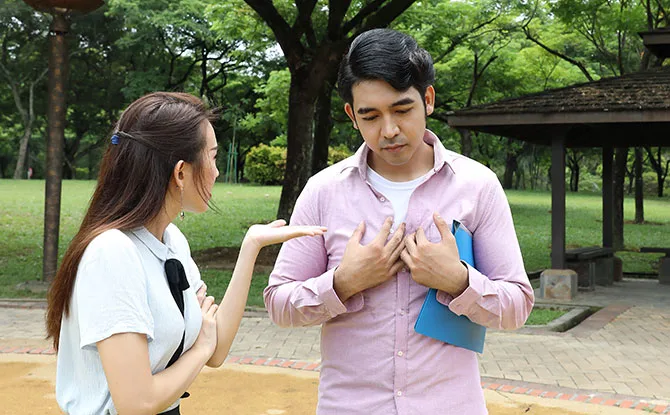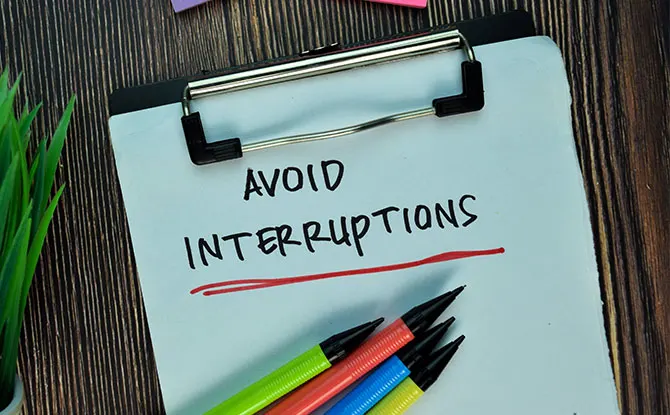Being able to communicate effectively is an essential skill in both personal and professional relationships. However, many of us struggle with the habit of interrupting others while they are speaking. Not only can this hinder effective communication, but it can also create misunderstandings and lead to frustration on both sides.
We believe that everyone can learn to be a better listener and engage in more mindful and respectful conversations.
In this article, we will provide practical tips on how to improve your communication skills and overcome the tendency to interrupt others.
How to Stop Interrupting People: Key Takeaways
- Effective communication requires active listening and respectful conversation etiquette.
- Mindful conversation techniques can enhance your communication skills.
- Tips to help you overcome interrupting habits include self-awareness and recognizing triggers.
Understanding the Impact of Interrupting

Interrupting someone during a conversation can have negative effects on the interaction and relationship between the individuals involved. When we interrupt others, we signal that we value our own thoughts and opinions more than theirs, which can cause frustration and resentment.
Additionally, interrupting can create misunderstandings and miscommunications, as the person we interrupt may not have had the chance to fully express their thoughts and feelings.
Interrupting can also hinder effective communication because it disrupts the flow of the conversation. When we interrupt, we may miss important information or fail to fully understand the other person’s point of view. As a result, we may not be able to engage in meaningful and productive conversations that lead to positive outcomes.
Active Listening Techniques

Effective communication is not just about speaking; it’s also about listening. Active listening is a skill that can be developed through practice and mindfulness. Here are some techniques that can help:
| Technique | Description |
|---|---|
| Maintain Eye Contact | Looking directly at the speaker shows that you are engaged and interested in what they have to say. |
| Ask Open-ended Questions | Using questions that require more than a yes or no answer encourages the speaker to share more and can lead to a more meaningful conversation. |
| Use Verbal and Non-verbal Cues | Nodding, saying “mm-hmm,” and other verbal cues show the speaker that you are listening. Non-verbal cues such as leaning forward or tilting your head can also convey attentiveness. |
| Avoid Interrupting | Wait for the speaker to finish their thought before responding. Interrupting can disrupt the flow of the conversation and make the speaker feel dismissed. |
| Reflect and Paraphrase | Repeating or rephrasing what the speaker has said in your own words can show that you understand their perspective and help to clarify any misunderstandings. |
These techniques can help us become better listeners and engage in more meaningful conversations. Remember that effective communication is a two-way street, and active listening skills can help us connect with others and build stronger relationships.
Cultivating Mindful Conversation

When engaging in conversations, it is essential to be present in the moment. The practice of mindful conversation helps us stay focused on the discussion while avoiding distractions. Moreover, it enables us to express ourselves and understand others with empathy and openness.
One way to cultivate mindful conversation is by practicing active listening. This means maintaining eye contact, nodding and using verbal cues to show that we are engaged in the conversation. Furthermore, asking open-ended questions can help us gain deeper insights into the speaker’s perspective. Active listening allows us to appreciate the speaker’s ideas and feelings, leading to more meaningful interactions.
Practical Tips for Cultivating Mindful Conversation
- Be present in the moment and avoid multitasking during a conversation.
- Minimize distractions by putting away electronic devices and focusing on the conversation at hand.
- Acknowledge the speaker’s perspective by nodding, using verbal cues and asking open-ended questions.
- Practice empathy by putting yourself in the other person’s shoes and seeing the situation from their point of view.
By practicing the art of mindful conversation, we can create a safe space for meaningful interactions and build stronger connections with those around us.
Overcoming Interrupting Habits

Breaking the habit of interrupting others can be challenging, but it is possible with self-awareness and practice. Here are some strategies we can implement:
- Recognize triggers: Pay attention to what makes us interrupt others. Is it impatience, excitement, or the fear of forgetting what we want to say? Recognizing these triggers can help us become more aware of our interrupting habits.
- Pause before speaking: When we feel the urge to interrupt, take a deep breath and pause for a few seconds. This can help us gather our thoughts and respond in a more thoughtful and respectful manner.
- Listen actively: Instead of focusing on what we want to say, actively listen to the other person’s words and try to understand their perspective. This can help us engage in more meaningful conversations and reduce the likelihood of interrupting.
Remember, it takes time and effort to change our habits, but with consistent practice, we can become better listeners and have more respectful conversations.
Etiquette for Listening
Listening is a crucial aspect of effective communication, and it’s important to cultivate proper listening etiquette to create respectful and meaningful conversations. Here are some guidelines to keep in mind:
- Avoid interrupting: Interrupting can be frustrating and disruptive to any conversation. Refrain from cutting someone off mid-sentence, and allow them to finish their thought before responding.
- Respect turn-taking: Conversations should involve a give-and-take approach. Make sure to give others an opportunity to speak, and wait your turn to contribute to the conversation.
- Avoid dominating conversations: While it’s important to share your thoughts and feelings, it’s equally important to let others express themselves as well. Don’t dominate the conversation and give others the space to share their perspective.
- Show attentiveness: Listening is not just about hearing the words being said, but also understanding the underlying messages and emotions. Use verbal and nonverbal cues to show that you’re engaged and listening, such as maintaining eye contact and nodding your head when appropriate.
By following these guidelines, we can create an environment where everyone feels respected and heard during conversations. Remember, effective communication is a two-way street, and it’s important to cultivate proper listening etiquette to ensure that all parties feel valued and understood.
Effective Communication Strategies
In addition to active listening techniques, there are other strategies that can help us become more effective communicators. By being intentional about how we engage in conversations, we can build stronger connections and foster more meaningful interactions.
1. Active Engagement
Active engagement involves demonstrating interest and participating fully in conversations. It requires us to be present in the moment and give our full attention to the speaker. By doing so, we can build better rapport and show respect for the other person’s perspective.
“Active listening is not just about hearing words, it’s about hearing what the other person is saying and understanding their point of view. This means putting aside our own biases and preconceptions to truly listen and engage in the conversation.”
2. Clear Expression
Clear expression involves communicating our thoughts and ideas effectively. It requires us to use language that is easy to understand and to be concise and direct in our communication. By doing so, we can avoid misunderstandings and build mutual trust and respect.
“When we express ourselves clearly, we create a space for open dialogue and a shared understanding. This allows us to connect with others and build stronger relationships.”
3. Adapting Communication Style
Adapting our communication style involves tailoring our approach to the specific individual or situation. It requires us to be flexible and empathetic in our communication, taking into account the other person’s communication style and preferences.
“By adapting our communication style, we can build trust and understanding, even in situations where there may be differences in opinions or perspectives. This allows us to work towards shared goals and create meaningful solutions.”
By implementing these strategies, we can become more effective communicators and build stronger connections with those around us. As always, it is important to approach conversations with an open mind and a willingness to learn and grow.
The Power of Pause

One of the most effective ways to avoid interrupting others and engage in more mindful conversations is through the power of pause.
By taking a moment to reflect before speaking, we can gather our thoughts and respond in a more thoughtful and respectful manner. This is especially important in situations where emotions may be running high or when discussing sensitive topics.
Pausing not only allows us to gather our own thoughts but also gives the other person time to fully express themselves. By actively listening to their words, tone, and body language, we can better understand their perspective and respond in a way that shows we value their input.
However, it’s important to note that pauses should not be awkward or prolonged. Instead, embrace brief pauses in conversation as a natural part of the exchange. Don’t feel the need to fill the silence with unnecessary words or interruptions.
Listening with Empathy
In order to have meaningful conversations and build stronger connections, it’s important to practice respectful listening. This means showing genuine interest in the thoughts and emotions of the person speaking, and validating their feelings.
One way to cultivate empathy in conversations is to actively listen and try to understand the other person’s perspective. This involves putting aside our own biases and assumptions, and allowing ourselves to be fully present in the moment. We can also show empathy by acknowledging the emotions being expressed, and responding in a supportive and non-judgmental way.
Another key aspect of respectful listening is avoiding judgment or criticism. Instead, we can create a safe and open space for dialogue by remaining curious and asking questions to gain a deeper understanding of the topic at hand. Above all, it’s important to remember that no one person has a monopoly on knowledge or experience, and we can always learn from others if we approach conversations with an open mind and heart.
Enhancing Speaking Skills
Improving our speaking skills is just as essential as developing our listening skills to create meaningful conversations. It’s vital to communicate our thoughts and feelings clearly and respectfully. Here are some tips to enhance your speaking skills:
- Choose your words wisely: Start your sentences with clarity, explain your point sensitively, and avoid being judgmental.
- Use appropriate tone and volume: Speak with confidence, enthusiasm, and regulation.
- Mindful of non-verbal cues: Be aware of your body language, avoid crossing your arms, and maintain eye contact to show your attentiveness.
As important as it is to enhance our speaking skills, it’s also important to practice good conversation etiquette. Here are some tips to help you communicate in a way that is respectful of others:
- Avoid talking too much: Be aware of the time you are taking in the conversation and give others the opportunity to speak.
- Don’t interrupt: Respect the speaker’s turn to speak and hold off your thoughts until it’s your turn.
- Be mindful of your tone: Avoid being dismissive, rude, or condescending in your tone.
By following these tips and staying mindful of our conversation etiquette, we can improve our speaking skills and create more respectful and meaningful conversations. Remember, communication is a two-way street; we must listen attentively and speak with intention to make genuine connections.
Navigating Challenging Conversations

At times, conversations can become difficult, heated or uncomfortable. In these situations, we may be prone to interrupting others or dominating the conversation. However, it is important to remember that respectful listening and effective communication are crucial, especially in challenging conversations.
Managing Conflict
When we find ourselves in conflict with someone, it is essential to remain calm and composed. We must try to understand the other person’s point of view, and strive to find common ground. Interrupting or talking over them will not help resolve the conflict. Instead, we should actively listen to what they have to say and respond thoughtfully, with consideration.
Addressing Differing Opinions Respectfully
It is not uncommon to have differing opinions in conversations, especially on complex or sensitive topics. In situations like these, it is important to maintain an open mind and be respectful of others’ views, even if we do not agree with them. Interrupting or dismissing someone’s opinion can create tension and hinder progress. Instead, we should listen attentively, seek to understand and respond with tact and kindness.
Creating a Safe and Inclusive Space for Dialogue
When engaging in challenging conversations, it is essential to create an environment where everyone feels safe and included. This means ensuring that there is mutual respect and that everyone feels heard and valued. Interrupting someone can make them feel dismissed or excluded, which can affect the overall atmosphere of the conversation. Instead, we must foster an environment of empathy and understanding, where everyone’s voice is given equal weight.
By adopting these strategies, we can navigate challenging conversations with greater ease and success. Remember that listening respectfully and responding thoughtfully are key to building stronger connections and having more meaningful conversations.
Conclusion
We hope that this article has provided valuable insights into how to stop interrupting people and engage in more mindful and respectful conversations. Effective communication skills are essential in building stronger connections with others and fostering more meaningful interactions.
By understanding the negative impact of interrupting, practicing active listening techniques, cultivating mindful conversation, and implementing strategies to overcome interrupting habits, we can become better listeners and communicators.
Listening etiquette, effective communication strategies, and the power of pause are also crucial factors in improving our conversational skills. By enhancing our speaking skills and navigating challenging conversations with etiquette and communication techniques, we can create a safe and inclusive space for dialogue.
Remember, communication is a two-way street, and it requires effort from both parties to engage in effective and respectful conversations. Let’s strive to become better communicators by practicing these tips and techniques in our daily interactions.
FAQ
Q: How can I stop interrupting people?
A: To stop interrupting people, it is important to develop effective communication skills. This includes actively listening, maintaining eye contact, and practicing empathy. By being mindful and respectful in conversations, you can overcome the habit of interrupting others.
Q: What are the negative effects of interrupting during conversations?
A: Interrupting can hinder effective communication, create misunderstandings, and lead to frustration for both parties involved. It can disrupt the flow of conversation and prevent individuals from fully expressing their thoughts and ideas.
Q: What are some active listening techniques?
A: Active listening techniques include maintaining eye contact, asking open-ended questions, and providing verbal and non-verbal cues to show attentiveness. By actively engaging in the conversation and demonstrating genuine interest, you can become a better listener.
Q: How can I cultivate mindful conversations?
A: Cultivating mindful conversations involves being present in the moment, avoiding distractions, and practicing empathy. By being fully engaged in the conversation and creating a safe and inclusive space, you can enhance communication and build stronger connections.
Q: How can I overcome my interrupting habits?
A: Overcoming interrupting habits requires self-awareness, recognizing triggers, and implementing strategies to pause, listen, and respond mindfully. By consciously making an effort to improve your communication skills, you can break the habit of interrupting others.
Q: What is the etiquette for listening?
A: Etiquette for listening includes respecting turn-taking, refraining from dominating conversations, and giving others the space to express themselves. By practicing proper listening etiquette, you can create a respectful and balanced conversation.
Q: What are some effective communication strategies?
A: Effective communication strategies include active engagement, clear expression, and adapting your communication style to different individuals. By employing these strategies, you can improve your conversational skills and foster more meaningful interactions.
Q: Why is the power of pause important in conversations?
A: The power of pause allows for reflection before speaking, preventing interruptions and facilitating thoughtful discussions. Taking a moment to gather your thoughts can lead to more effective communication and understanding.
Q: How can I listen with empathy?
A: Listening with empathy involves understanding others’ perspectives, validating their feelings, and showing genuine interest in their thoughts and emotions. By practicing empathetic listening, you can create a supportive and understanding environment.
Q: How can I enhance my speaking skills in conversations?
A: To enhance your speaking skills, focus on choosing the right words, using appropriate tone and volume, and being mindful of non-verbal cues. By improving your speaking skills, you can contribute to more respectful and effective conversations.
Q: How can I navigate challenging conversations?
A: Navigating challenging conversations requires etiquette tips and communication techniques. It is important to manage conflict, address differing opinions respectfully, and create a safe and inclusive space for dialogue.

